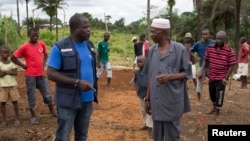In Guinea, opposition parties are accusing the government of President Alpha Conde of playing politics with the Ebola outbreak as an excuse to delay municipal elections slated at the end of the year and also the presidential ballot in 2015. Many believe it would be impossible to organize voting with a health emergency of this magnitude.
The Ebola outbreak is impacting every part of life here in Guinea, restricting personal interactions, slowing commerce and exhausting the healthcare system.
But the political opposition says that is no reason to postpone elections in the coming months.
This, despite World Health Organization predictions that the number of new Ebola cases will spike up to 10,000 per week by December in Guinea, Liberia and Sierra Leone - the hardest hit nations.
Dansa Korouma, chairman of the Guinean Civil Society Movement, says he thinks the government has no other choice but to delay voting in local elections this year and possibly the Presidential vote in 2015.
He says Ebola is truly a serious public health threat in Guinea. And even though civil society members would never support a delay in elections, Ebola poses unique challenges that would make voting improbable. He says all elements of society must do their part to contain Ebola and politicians should not be playing politics.
Opposition: cry foul if election postponed
But the opposition is contending that the government will use the delay in order to rig an eventual election or to capitalize on its fight against Ebola to woo voters.
Guinea only returned to civilian rule four years ago following a 2008 coup. The country held its first election in 2010 - voting in Alpha Conde as a president in what international observers deemed a valid ballot. Parliamentary elections were held in September 2013 after repeated delays.
The Guinean Electoral Commission has come under severe criticism in the wake of the postponement of this year's vote. The opposition is accusing the commission of bias in favor of the ruling RPG-Rainbow coalition party and is planning to introduce a bill in parliament to restructure the commission.
Liberia also cancelled a national Senate election last week due to the Ebola epidemic.
President Conde has stressed his is solely focusing on containing the Ebola outbreak - the worst in history and which started in Guinea in December.
Guinea has diagnosed more than 1,100 cases with more than 620 people dying from the virus. Health experts say the numbers are likely to be vastly higher than what officials have been able to record- given the scarcity of medical resources. There is no cure for Ebola, but early diagnosis and medical care can improve chances of survival. Currently this Ebola Outbreak has a mortality rate of 70 percent.
Guinea’s government is now calling on all retired doctors to come join the fight. Skilled medical personnel are one of the most critical needs in West Africa’s battle against the virus.
